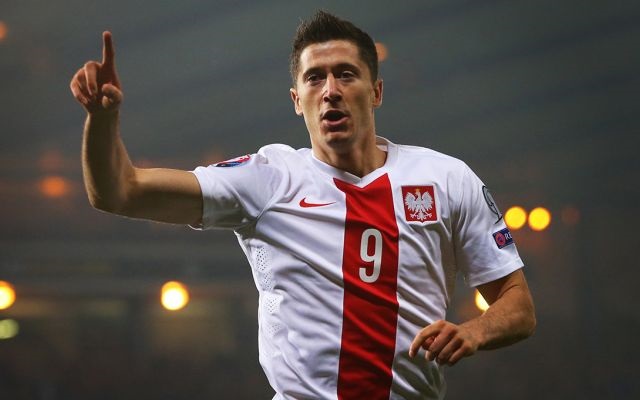Poland’s men’s football team will be able to call upon the services of their talismanic captain Robert Lewandowski and his strike partner Krzysztof Piątek for their forthcoming World Cup qualifying match against England. The decision follows doubts over the German-based pair’s participation as a result of quarantine rules.
The Polish government and football association praised the role of Prime Minister Mateusz Morawiecki in intervening by discussing the matter with German chancellor Angela Merkel, although a statement from the German health ministry suggests that this was ultimately not a factor in the decision.
There had been fears that Lewandowski and Piątek’s clubs, Bayern Munich and Hertha Berlin, would not allow them to play in the crunch match at Wembley Stadium on 31 March as they would have had to undergo a 14-day quarantine upon their return to Germany from the UK.
That changed on Friday evening when the Robert Koch Institute, the German authority tasked with monitoring the pandemic, removed the UK from the list of high-risk countries requiring quarantine, reports Sport.pl.
🔴 Polish FA President Zbigniew Boniek says Poland national team will fly to it's World Cup qualifier game against England "in full squad," suggesting that despite previous concerns Lewandowski, Milik & Piątek WILL be able to play at Wembley after all. 🔥 https://t.co/x7OnXTOKZR
— Jakub Krupa (@JakubKrupa) March 19, 2021
In the meantime, however, representatives of the Polish football association PZPN as well as the government had been working to ensure that the players would be exempted from quarantine by travelling using a special isolated “corridor”, reports Onet.
Polish government spokesman Piotr Muller confirmed that “Prime Minister Mateusz Morawiecki contacted Chancellor Angela Merkel personally to enable the participation of our footballers in the forthcoming match”, reports the Polish Press Agency (PAP).
“Situations of this kind are rather exceptional, but owing to the significance of the issue for the Polish national team and for fans, we decided that as a state we should intervene at the highest political level,” confirmed Paweł Jabłoński, an undersecretary of state in the foreign ministry.
Zbigniew Boniek, the current head of PZPN and himself a former star of the national team, tweeted “we are going to London at full strength”, thanking the prime minister and “everyone who helped us”.
Maciej Sawicki, the PZPN’s secretary general, told Polskie Radio that the prime minister’s intervention “certainly helped us a lot”, resulting in the German government’s decree taking the United Kingdom off the quarantine list.
However, Teresa Nauber, a spokesperson for the German health ministry, told Sport.pl that the decision was in fact based on the Robert Koch Institute’s analysis of risk areas.
In response to near-record levels of coronavirus infections, Poland's government today introduced new nationwide restrictions https://t.co/xD1y3FO4Nu
— Notes from Poland 🇵🇱 (@notesfrompoland) March 20, 2021
“The decisive factor when classifying a given area…is the spread of a mutation that is not also widespread in Germany and could contribute to the increase of particular risk in our country,” Nauber said.
The institute’s decision was based on British infection statistics and had nothing to do with Morawiecki’s discussion with Merkel, Thomas Dudek, a German journalist, told Sport.pl. He dismissed claims that diplomatic efforts were the reason as “fairy tales”.
Poland’s national team, which begins its qualifying campaign under new manager Paulo Sousa away to Hungary on Thursday before playing Andorra in Warsaw on Sunday, will be more confident of a successful trip to London with Lewandowski, who was recently named the best player in the world for 2020 by FIFA.
Polish footballer Robert Lewandowski has been named as the best FIFA men's player of the year.
The striker had an incredible season in which he scored 55 goals in just 47 matches, helping Bayern Munich win the Bundesliga, Champions League and German cup https://t.co/GhutofsV3d
— Notes from Poland 🇵🇱 (@notesfrompoland) December 17, 2020
The 32-year-old striker, who has scored 63 goals in 116 appearances for the national side, is in the form of his life. On Saturday he hit a first-half hat-trick for Bayern to take his tally for the season to 35 in 25 games, just five short of Gerd Müller’s all-time record.
Lewandowski was today awarded the Commander’s Cross of the Order of Polonia Restituta, the second highest civil honour in Poland, by President Andrzej Duda. The award was bestowed “for exceptional sporting achievements and promoting Poland in the international arena”.
His fellow striker Piątek, who joined Hertha Berlin last year after a spell in Italy, has scored seven goals in 15 international appearances.
Poland have not beaten England since a World Cup qualifier in Chorzów in 1973. But it was the hard-fought 1-1 draw at Wembley later the same year that has entered Polish football folklore. The result ensured Poland’s qualification for the 1974 tournament in Germany, in which they finished third.
Prezydent @AndrzejDuda z Pierwszą Damą i mistrz @lewy_official pic.twitter.com/4eILjawgBD
— Jakub Szymczuk (@jakub_szymczuk) March 22, 2021
Main image credit: Nazionale Calcio/Flickr (under CC BY 2.0)

Ben Koschalka is a translator, lecturer, and senior editor at Notes from Poland. Originally from Britain, he has lived in Kraków since 2005.




















